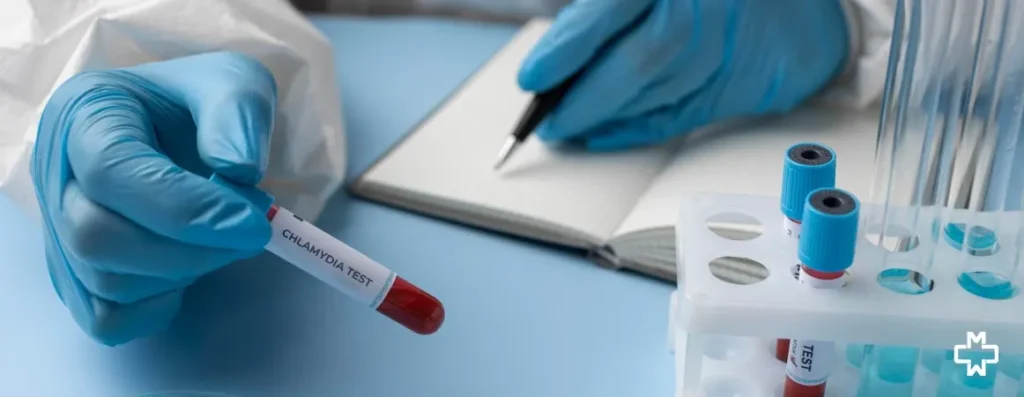Chlamydia is a common bacterial sexually transmitted disease (STD) that is caused by Chlamydia trachomatis. It can spread during vaginal, anal, or oral sex with someone who’s infected. According to the Centers for Disease Control and Prevention, Chlamydia is the most frequently reported bacterial STI in the US, with approximately 2.86 million cases reported annually.
What are the symptoms of Chlamydia?
Early-stage Chlamydia often has no signs or symptoms. When they do occur, they start one or two weeks after exposure to Chlamydia. The symptoms include:
- Burning/itching when urinating
- Lower abdominal pain
- Abnormal vaginal discharge in women
- Discharge from the penis in men
- Testicular pain in men
- Pain during intercourse in women
- Rectal pain, discharge, or bleeding
- Also possible to acquire conjunctivitis (eye infection)
Chlamydia can easily be treated with antibiotics. If left untreated, it can cause serious health complications.
In women, it can cause pelvic inflammatory disease that can damage their fallopian tubes, ovaries, and uterus, including the cervix leading to infertility or potentially fatal ectopic pregnancy.
In men, untreated infection can cause infection near the testicles (epididymitis) which can but very rarely lead to infertility.
Who is at risk of contracting Chlamydia?
Anyone who’s had unprotected sex can get Chlamydia. However, sexually active young people are at a higher risk of contracting it. This is due to lifestyle and biological factors common among young people. Bisexuals and men who have sex with other men are also at an increased risk of contracting the infection.
Yearly screening is recommended for women who are 25 or younger. If you are older with risk factors like multiple sex partners, you should get tested for Chlamydia every year.
Gay, bisexual, men who have sex with other men, as well as pregnant women, should also get annually tested for Chlamydia.
How do you test for Chlamydia?
Many people with STIs are not aware of it because most of the time there are no symptoms. So, the only way to know for sure if you’re infected is to get tested.
Screening for Chlamydia is relatively simple. Tests include:
Nucleic Acid Amplification (NAA) is the recommended method of testing for Chlamydia. Since NAA tests (urine, swab, and DFA) search for the bacteria’s genetic material, it is unlikely to show the wrong results.
Urine Test: A sample of your urine tested in the laboratory may indicate the presence of an infection.
Swab Cultures: For women, a swab of discharge from the cervix is taken for culture or antigen testing for Chlamydia. This can be done using a routine Pap test. For men, the doctor inserts a swab to get a sample from the urethra or rectum.
Direct Fluorescent Antibody (DFA):
- Swab cultures
- Endocervical swab
- Male urethral swab
- Rectal swab
- Neonates conjunctival swab
How can you reduce your risk of getting Chlamydia?
The surest way to avoid an STI is to abstain from vaginal, anal or oral sex.
If you’re sexually active, you can do the following to reduce your risk of contracting the infection:
- Use latex condoms each time you have sex
- Limit your number of sexual partners
- Get screened regularly
When should you see a doctor?
If you’re sexually active or experience any of the above symptoms, make an appointment with us at Manhattan Medical Arts for advice and treatment about protecting your sexual health in the future. Also, see your doctor if your partner reveals he/she has Chlamydia or any other STI. We believe in providing accessible, cost-effective, and efficient preventive and primary care that meets the requirements of all our clients and strive to maintain the highest standards of safe and quality healthcare in all our facilities, for all our patients.
– Disclaimer –
This blog is for informational & educational purposes only, and does not intend to substitute any professional medical advice or consultation. For any health related concerns, please consult with your physician, or call 911.
-
About The Author
Dr. Syra Hanif M.D.Board Certified Primary Care Physician
Dr. Syra Hanif is a board-certified Primary Care Physician (PCP) dedicated to providing compassionate, patient-centered healthcare.
Read More







